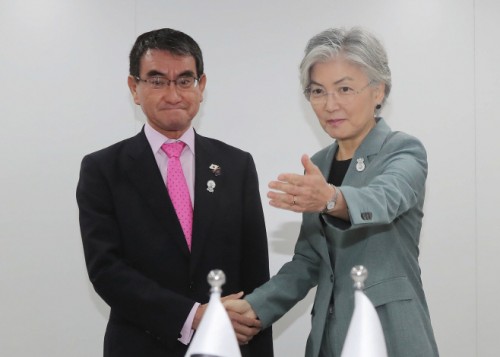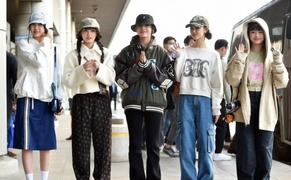 |
| South Korean Foreign Minister Kang Kyung-wha meets her Japanese counterpart Taro Kono during the ASEAN Foreign Ministers' Meeting in Bangkok, Thailand, August 1, 2019./ Source: Yonhap |
By AsiaToday Tokyo correspondent Um Soo-ah & reporter Lee Jang-won
South Korea’s Foreign Ministry on Monday summoned a Japanese diplomat to request Tokyo’s official explanation on its reported plan to discharge radioactive water from the 2011 Fukushima nuclear plant meltdown into the Pacific Ocean, while expressing safety concerns. Foreign ministry officials explained that the latest move was not intended to pressure Japan amid the ongoing conflicts with Tokyo. However, the issue of handling the contaminated water from Fukushima plant is likely to become one of the key agenda items to be discussed in the upcoming trilateral minister-level talks among South Korea, Japan and China, which begins Tuesday in Beijing.
Kwon Se-jung, the director general in charge of climate change and environmental affairs at Seoul’s foreign ministry, summoned Tomofumi Nishinaga, a minister for economic affairs from the Japanese Embassy in Seoul. Kwon delivered to him a note verbale containing the South Korean government’s stance in relation to environmental groups’ claims that Tokyo is planning to discharge the radioactive water from Fukushima plant into the ocean.
The move appears to be a follow-up measure after foreign ministry spokesman Kim In-chul revealed last week that the government would actively ask Japan to disclose information and to provide a concrete stance on the current management system and disposal plans. The government has been actively seeking ways to deal with Japan’s planned discharge of the Fukushima radioactive water since the Cabinet meeting on August 13.
In particular, the government requested Tokyo verify reports and claims of Greenpeace on the plan to discharge 1 million tons of contaminated water stored at the Fukushima nuclear plant, and clarify its future disposal scheme. The government also demanded Tokyo to provide more transparent and concrete explanations on the disposal plans to the international community.
The foreign ministry official said that information that Japan has so far provided about the contaminated water was not sufficient in the key part despite the Japanese government’s efforts to share information. “In particular, there was no official position and specific information on whether to discharge the contaminated water to the ocean. Therefore we demanded it,” the official said.
Tokyo has not made any official announcement, but it seems they are feeling pressure on the radioactive water from the Fukushima power plant. “Claims from civic groups do not represent Tokyo’s official position,” Nishinaga said.
As Japan is being cooperative in regards to the contaminated water disposal issue unlike its decision to remove South Korea from its whitelist of preferred trading partners as economic retaliation, some predict that this issue could play a significant role in the Seoul-Tokyo dialogue in the future.
According to Reuters, Foreign Minister Kang Kyung-wha and her Japanese counterpart Taro Kono will hold bilateral talks in Beijing on the sidelines of a trilateral foreign ministers meeting between Seoul, Tokyo and Beijing on Wednesday. The two sides are likely to discuss the extension of the countries’ military intelligence sharing accord known as the General Security of Military Information Agreement (GSOMIA). The South Korean government is also likely to demand Japan’s responsible response to the radioactive water issue.
#Foreign ministry #Kwon Se-jung #Tomofumi Nishinaga #Greenpeace #summon
Copyright by Asiatoday
Most Read
-
1
-
2
-
3
-
4
-
5
-
6
-
7





















